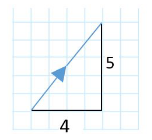vectors(y1)
1/8
There's no tags or description
Looks like no tags are added yet.
Name | Mastery | Learn | Test | Matching | Spaced | Call with Kai |
|---|
No analytics yet
Send a link to your students to track their progress
9 Terms
vectors
represent a movement with magnitude and direction
drawn using directed line segments

representing vectors
vectors can be drawn on a graph, this is useful for representing the displacement change relative to the x and y axes
they can be written by containing the x and y displacement co-ordinates in brackets with the x value above the y, known as a column vector

vector addition and subtraction
visually:
one vector is attached to another, the resulting vector can be determined by drawing a line from the start of the first vector to the end of the other, forming a triangle
to subtract a vector the vector's direction is reversed before it is added
numerically:
the individual axis values of each vector are added or subtracted
vector multiplication
multiplying a vector by a scalar is done by multiplying the length(or the co-ordinate change from one end to another) by said scalar
multiplying by negative numbers reverses the direction
unit vectors
vectors with a magnitude of 1
they may have an x co-ordinate change of 1 and a y co-ordinate change of 0 (i) or vice versa (j)
any two-dimensional vectors can be written as pi+qj
they may also be diagonal(x and y co-ords between 0 and 1)
calculating a unit vector
a unit vector in the direction of a is a/|a|
(where a is the vector and |a| is the scalar magnitude)
vector magnitude and direction
the magnitude of a vector is calculated using pythagoras
direction is calculated using trigonometry, expressed as an angle anticlockwise from the positive x axis(unless otherwise specified)
parallel vectors
two vectors are parallel if they are scalar multiples of eachother
position vectors
vectors describing the position of a point in relation to the origin
notated as OP with an arrow pointing right on top, where O is the origin and P is the point